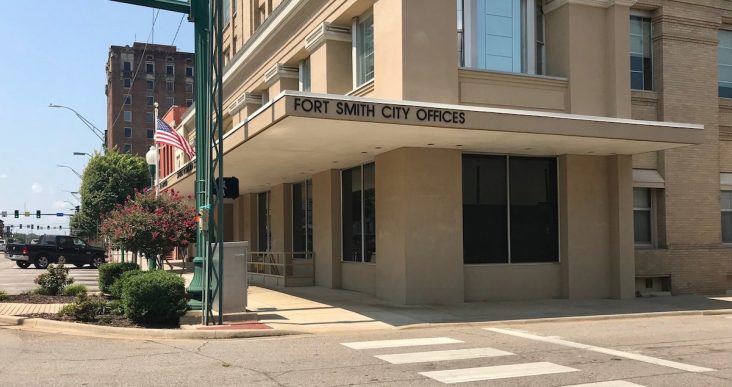Fort Smith Board takes step to delay Feb. 8 sales tax election
by December 20, 2021 7:08 pm 523 views

The Fort Smith Board of Directors agreed Monday (Dec. 20) to call a special board meeting at 11:30 a.m., Tuesday (Dec. 21) to discuss the repeal of the Feb. 8 special election for the 0.25% and 0.75% sales and use Tax.
Director Lavon Morton said Monday that in the two to three weeks following the Nov. 16 board vote to hold the election, there had been a number of instances when citizens and the media had commented that the election seemed rushed.
“I have reached out to many people. People have reached out to me. There appears to be a desire by community leaders to provide more information on this,” Morton said. “We know our needs and how the money is spent and why this tax is needed, but we need to communicate that (to our citizens,)” Morton said.
Director Kevin Settle said he would like to see the election moved to May. He, Morton and others said that would give the directors more opportunity to communicate through numerous ward meetings and discussions why the tax is needed and how it will be used. Morton and Director Neal Martin also discussed their desire to see the 0.25% sales tax for parks and the fire department be only for 10 years rather than 20 years.
“Capping it at 10 years would be good. I should have said that at the time,” Martin said, regarding the Nov. 16 board meeting when the election was set.
He also said he would like to have language in the ordinance that says if the consent decree sewer work is completed before 10 years, the 0.75% sales and use tax would be allowed to sunset.
The city board on Nov. 16 voted to approve two sales tax extensions. The first will extend a 0.25% city sales tax from Sept. 20, 2022 to Sept. 20, 2042, to support the fire department and the parks department. That tax generated $5.7 million in 2020. The second would extend a 0.75% sales tax from Jan. 1, 2022, to Dec. 31, 2033, with 83.3% of the revenue going to federal consent decree work on the city’s water and sewer system, and 16.7% directed to the city’s police department. The tax generated $16.99 million in 2020.
In order to stop the Feb. 8 special election, the board will need to repeal all four ordinances that set the taxes and election. The board can then study and discuss the sales taxes and set a special election later in the year if they chose to do so, City Administrator Carl Geffken said.
At a Citizens Against Unfair Taxes press conference Dec. 14, Fort Smith attorney Joey McCutchen urged the Fort Smith Board of Directors to push back the Feb. 8 special election. He said the city could hold the tax election at a later time in the year, thus giving all citizens the chance to provide input and learn about the need, he added. One aspect of the taxes that concerns the Citizens Against Unfair Taxes is the length of the taxes. If approved, 0.25% sales tax will be collected for 20 years and the 0.75% will be collected for 10 years, the way the ordinances are now written.
“Why would we approve a tax for 20 years when the city’s capital improvement projects only go out 10 years?” McCutchen said.
Fort Smith City Attorney Jerry Canfield said Monday that city staff and attorneys are engaged with the Department of Justice (DOJ) regarding the consent decree and that court could be happening relatively soon regarding the consent decree. He said delaying the special election regarding the tax could be seen by the DOJ as not vigorously pursuing action to finance consent decree work
“It may factor negatively to the city’s position,” Canfield said.
Martin disagreed, and said he did not think the city should rush an election where citizens are not fully educated on the need and uses of the tax just to mollify the DOJ.
“The DOJ and EPA (Environmental Protection Agency) know we are serious,” Martin said.
After years of failing to maintain water and sewer infrastructure to federal standards, the city entered into a federal consent decree with the EPA and DOJ in late 2014. The consent decree required the city to make an estimated $480 million worth of sewer upgrades over the course of 12 years. Because of inflation and the state of the city’s sewer system, that number is estimated to be closer to $650 million.
Over the past six years, the city has spent approximately $127 million in capital costs for required improvements added to the $200 million on storage tanks and equalization basins to reduce wet weather sanitary sewer overflows, the basis for the consent decree requirements, spent prior to the consent decree. Utilities Director Lance McAvoy estimates the city will need to spend more than $600 million more in order to complete the necessary work.
